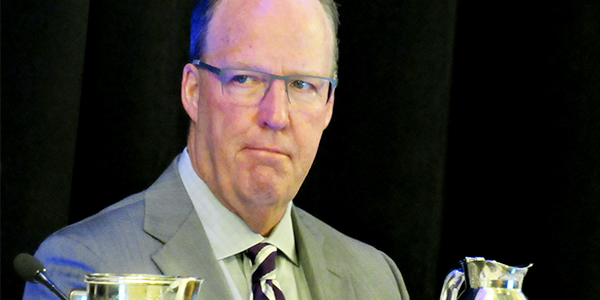MISO will not open its doors to stakeholders or other visitors for at least the rest of the year as the coronavirus pandemic runs its course, the RTO said Tuesday.
All remaining stakeholder meetings in 2020 will be held via teleconference, MISO Vice President of Strategy and Business Development Wayne Schug said during an Informational Forum.
The decision represents yet another — and more drastic — extension of MISO’s COVID-19 response measures of holding virtual stakeholder meetings and restricting access to control rooms, policies the RTO last month had extended to June 1. (See MISO Extends COVID-19 Measures.)
MISO is also contemplating what timeline and safety precautions to follow before allowing select employees to physically return to its three office locations.
“We’re developing contingency plans,” CEO John Bear said, adding that MISO is seeking stakeholder input on a staged reopening in 2021.
“We’re looking to allow more staff to return to the office at least on a periodic basis. We’re trying to balance work from home with our business interests and with our staff’s personal needs,” Schug said, noting that MISO expects some employees will have difficulty lining up childcare or have family members that are more susceptible to the disease.
Schug said MISO continues to work with epidemiologists to bring some employees back in a “safe and predictable manner.” He also said it may consider holding some off-site in-person meetings later this year.
“Having said that, we understand the pandemic is a very dynamic situation,” Shug said, adding that MISO would adjust dates and virtual meeting setups as necessary.
Schug said MISO will ask stakeholders during a June 17 Advisory Committee meeting for advice based on how their companies are navigating staged reopenings and deciding when to welcome visitors back into their offices. The AC meeting is part of the Board Week that was originally slated to take place June 16-18 in Milwaukee. Those meetings will now be spread out in virtual format over June 10-18 to keep the meeting schedule more manageable.
“Based on what we’re hearing from you — and the world around us — our September meeting will likely be virtual, with a hope we can meet up in Orlando in December,” Bear said.
MISO’s quarterly Board Week in September was scheduled to be held in St. Paul, Minn.
MISO Executive Director Real-Time Operations Rob Benbow said no essential MISO control room personnel have tested positive for the virus to date.
“The control room staff have been doing a good job of isolating themselves … and maintaining that physical distance at work and at home,” Benbow said.
Kevin Murray of the Coalition of MISO Transmission Customers asked how often the RTO orders virus testing and whether it has had difficulties securing tests for its employees.
Benbow said essential employees so far are only tested off-site if they experience symptoms. Operators are responsible for reporting any symptoms and isolating at home until they’ve been tested.
“We require them to have two negative tests before they return to work, so we’ve had about four to five operators go through this process,” Benbow said.
In the meantime, Bear said MISO’s virtual stakeholder meetings have been going smoothly.
“I think we’re going to have some wonderful productivity and efficiencies out of this that can help reduce our costs,” Bear said.
Schug said energy and demand in the footprint is currently trending down about 11% compared to usual spring consumption.
“We anticipate that as stay-at-home orders are lifted and things return to more normal patterns, those numbers will trend back up, but it’s too hard to tell because those orders have just started to be lifted,” Schug said.
MISO has reported that load has been about 10% below average because of the pandemic for about a month. Executives said that as some business reopen, they expect surges in load.
By April 6, 11 of the 15 MISO states were under a stay-at-home order. By the end of the month, three states ended their orders, with the remaining set to expire before the end of this month.
Benbow said MISO has been calculating what load would look like without the pandemic’s effects to prepare itself for a return to more normal load.
However, April’s below-normal temperatures and shelter-in-place directives cut peak load by 10 GW — to 73 GW —compared with the same period last year.
Real-time prices fell more sharply, with LMPs averaging $18/MWh compared with $26/MWh last April.
Benbow said natural gas prices in particular have been battered by the pandemic, with Chicago Citygate trading at an average $1.68/MMBtu, down from $2.46/MMBtu a year ago, and Henry Hub at $1.69/MMBtu, down from $2.59/MMBtu.
In the midst of the widespread quarantine measures, MISO set a new all-time wind generation peak of 18 GW on April 9.
Queue Waiver Request Before FERC
MISO has also requested a 60-day extension of its June 25 deadline for developers to demonstrate exclusive land use for projects entering MISO South’s 2020 interconnection cycle. (See MISO to File 1st COVID-19 Queue Waiver Request.) The RTO asked for FERC to issue an order on the waiver by Friday (ER20-1794).
Chris Supino, with MISO’s legal department, said the waiver request doesn’t foreclose individual waivers for interconnection customers.
“Obviously a customer is free to go to FERC and request any waiver they want,” Supino said during a May 12 conference of the Interconnection Process Working Group. He urged customers to notify MISO of their situations to allow it to file supporting comments with FERC, should it deem a waiver necessary.
Supino said MISO will re-evaluate the need for further queue waivers if COVID-19 restrictions pick back up or continue for another month.
“It’s easy to go overboard at first, and we’re trying to take an incremental approach,” Supino said.





